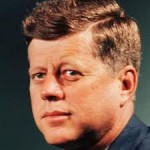
The war that wasn't, was a game that never should have been played.
by Mel Watkins
Pick your war and the Harper government will celebrate it. Their attitude is, "Sure it was bloody, but war’s war, and we’re the better for it."
But might it not make more sense to celebrate the wars and the killing that didn’t happen? And the peace, the absence of war, that did? Memory matters, truly matters, if we are ever to learn and stay alive in the era of weapons of mass destruction. What we remember and how we remember it is far too important to be left to those who worship warriors and count the dead as part of the celebration.
So let’s remember 2012 not as the 200th anniversary of the War of 1812, but as the 50th anniversary of the Cuban Missile Crisis, of the averted nuclear war between the US and the USSR. The nuclear blasts could have killed 200,000,000 (two hundred million) people or more.
On the verge of a holocaust the likes of which had never been seen, both sides blinked, and sanity prevailed for the moment.
The crisis took place over ten days in October 1962. USSR Premier Nikita Khrushchev resolved to put nuclear missiles (aka the Bomb) in Cuba, with Castro’s approval, to defend Cuba and Russia's interests in the hemisphere. Given the times, that was rational enough: the US had invaded Cuba in the Bay of Pigs operation in 1961 and continued to threaten Cuba’s very survival, including an on-going secret Operation Mongoose aimed at assassinating Castro. Also, please note, US-led NATO had put such missiles in Turkey next door to the USSR.
US President John F Kennedy threw up a naval blockade to stop Russian ships bearing missiles. The world watched as confrontation loomed, with both superpowers on high nuclear alert.
On the verge of a holocaust the likes of which had never been seen, both sides blinked, and sanity prevailed for the moment. But it was one very close call — indeed, we know from the archives that we came even closer to catastrophe than was imagined at the time. On more than one occasion, we were moments from that push of a button.
For what it’s worth, had the horrors happened, some surviving historians would almost certainly have said that was “inevitable” — for such is the grip of determinism on the conventional mind. As for this writer, he has read enough breathless accounts of this crisis to conclude that what happened at the end was in some, if not large part, a matter of luck, which just happened to be good rather than bad. Still, given good luck has prevailed ever since Hiroshima and Nagasaki, perhaps there really is a taboo about using the Bomb. Since the Bomb is still around, we should hope so — indeed, so insist.
Given good luck has prevailed ever since Hiroshima and Nagasaki, perhaps there really is a taboo about using the Bomb.
American capitalism and Soviet communism were in this terrible struggle, this potentially most deadly of wars, for which, apparently, any risk was justified. We know now that this near death experience was all for naught. Thirty years later, communism crumbled from its own contradictions and we are entitled to wonder whether all that male hysteria in 1962 was really necessary.
The Russians withdrew the nuclear missiles from Cuba. The Americans withdrew the nuclear missiles from Turkey. Life continued on the planet. We are left to wonder what the fantastic fuss was all about.
There’s a vast literature on this crisis. It's easy to get caught up in how the “game” was played on a day-to-day, even hour-to-hour basis, but to do that is to risk missing the main point — that this is a game that should never have been played.
The good that came out of the Cuban Crisis was a realization by both sides that there had to be arms control with respect to nuclear weapons. But it was a half-good, not good enough: what still needs to be learned is that this cursed weapon could all too easily escape control and, being without goodness, must be abolished.
Where’s the Canadian content? In all the outpouring of American writing, I don’t recall ever seeing a mention of Canada as having any relevance, much less input, to decision-making. Such is the nature of democracy in the real world of the Bomb.
What did happen in Canada was that Washington put American forces on alert, and when Prime Minister Diefenbaker — a pre-Harper Progressive Conservative — dithered (I would think to his credit), his Defence Minister secretly put the Canadian forces on alert. A serious violation of democracy, surely.
The Cuban Missile Crisis contributed to a political crisis in Canada over the need for nuclear-armed missiles stationed in Canada. The hawks, headed by Liberal leader Pearson, won, and the US positioned nuclear weapons in the Far North, on Candian soil. Not something to celebrate. The Bomb is a vile thing, destroying the peacekeeping reputation of the only Canadian to have won a Nobel Peace Prize.
© Copyright 2012 Mel Watkins, All rights Reserved. Written For: StraightGoods.ca
 Mel Watkins is Professor Emeritus of Economics and Political Science, University of Toronto. He is Editor Emeritus of This Magazine and a frequent contributor to Peace magazine. He is a memer of Pugwash Canada and former President of Science for Peace.
Website: http://www.progressive-economics.ca/author/mel-watkins/.
Mel Watkins is Professor Emeritus of Economics and Political Science, University of Toronto. He is Editor Emeritus of This Magazine and a frequent contributor to Peace magazine. He is a memer of Pugwash Canada and former President of Science for Peace.
Website: http://www.progressive-economics.ca/author/mel-watkins/.
Sorry, the comment form is closed at this time.